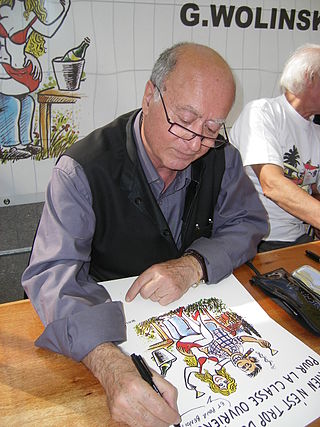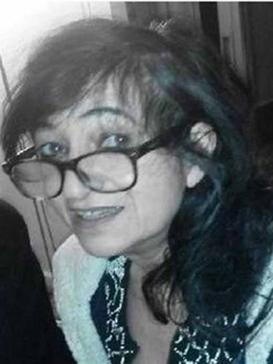 | |
| Location | Paris, France |
|---|---|
| From | Passage Sainte-Anne Popincourt |
| To | Rue Pelée |
The Rue Nicolas-Appert is a street located in Paris, France.
 | |
| Location | Paris, France |
|---|---|
| From | Passage Sainte-Anne Popincourt |
| To | Rue Pelée |
The Rue Nicolas-Appert is a street located in Paris, France.
The street is located in the Saint-Ambroise neighbourhood of the 11th arrondissement of Paris. [1] It starts at the Passage Sainte-Anne Popincourt and runs all the way to the Rue Pelée. [1] It is 137 metres (449 ft) long and 15 metres (49 ft) wide. [1]
It was constructed in 1985 [2] and named in honor of Nicolas Appert (1749-1841), a French businessman who invented airtight food preservation. [1]
The Comédie Bastille, a theatre, is located at number 5. [3]
On 7 January 2015 the offices of the satirical weekly newspaper Charlie Hebdo at 10 rue Nicolas-Appert were attacked by Islamist terrorists. A commemorative plaque on the building records the names of eleven of the twelve people who were killed there. Charlie Hebdo has since moved. [4] In September 2020, there was a stabbing attack outside of the former headquarters of Charlie Hebdo.

The Avenue de l'Opéra was created from 1864 to 1879 as part of Haussmann's renovation of Paris. It is situated in the center of the city, running northwest from the Louvre to the Palais Garnier, the primary opera house of Paris.

The Coulée verte René-Dumont or Promenade plantée René-Dumont is a 4.7 km (2.9 mi) elevated linear park built on top of obsolete railway infrastructure in the 12th arrondissement of Paris, France. It was inaugurated in 1993.
Charlie Hebdo is a French satirical weekly magazine, featuring cartoons, reports, polemics, and jokes. The publication has been described as anti-racist, sceptical, secular, libertarian and within the tradition of left-wing radicalism, publishing articles about the far-right, religion, politics and culture.

Paris Métro Line 8 is one of the sixteen lines of the Paris Métro. It connects Balard in the southwestern part of Paris to Pointe du Lac station in the southeastern suburbs, following a parabolic route on the Rive Droite of the Seine. The last line of the original 1898 Paris Métro plan, which opened in July 1913, it was initially intended to link Porte d'Auteuil and Opéra. With 105.5 million travellers in 2017, it is the network's eighth busiest line; at 23.4 km (14.5 mi) in length, it is also the second longest Métro Line after Line 13, and the longest fully straight line, as line 13 has branches. Along with Line 7, it serves the most stations of any line on the network, at 38. Line 8 interchanges with all but three other Métro lines.
The Cours Florent is a private drama school in Paris, France, established in 1967 by French theater actor François Florent.

Georges David Wolinski was a French cartoonist and comics writer. He was killed on 7 January 2015 in the Charlie Hebdo shooting.

Fleury-Mérogis Prison is a prison in France, located in the town of Fleury-Mérogis, in the southern suburbs of Paris. With more than 4,100 prisoners, it is the largest prison in Europe. It is operated by the Ministry of Justice.

The Porte Saint-Antoine was one of the gates of Paris. There were two gates named the Porte Saint-Antoine, both now demolished, of which the best known was that guarded by the Bastille, on the site now occupied by the start of Rue de la Bastille in the 4th arrondissement of Paris.

The Quai Voltaire is a street located in the 7th arrondissement of Paris. 308 meters long, it lies between the Quai Malaquais and Quai Anatole-France. The Quai Voltaire begins at the Rue des Saints-Pères and ends at the Rue de Bac and the Pont Royal.

Nicolas Appert was a French confectioner and inventor who, in the early 19th century, invented airtight food preservation. Appert, known as the "father of food science", described his invention as a way "of conserving all kinds of food substances in containers".

On 7 January 2015, at about 11:30 a.m. in Paris, France, the employees of the French satirical weekly magazine Charlie Hebdo were targeted in a shooting attack by two French-born Algerian Muslim brothers, Saïd Kouachi and Chérif Kouachi. Armed with rifles and other weapons, the duo murdered 12 people and injured 11 others; they identified themselves as members of al-Qaeda in the Arabian Peninsula, which claimed responsibility for the attack. They fled after the shooting, triggering a manhunt, and were killed by the GIGN on 9 January. The Kouachi brothers' attack was followed by several related Islamist terrorist attacks across the Île-de-France between 7 and 9 January 2015, including the Hypercacher kosher supermarket siege, in which a French-born Malian Muslim took hostages and murdered four people before being killed by French commandos.

"Je suis Charlie" is a slogan and logo created by French art director Joachim Roncin and adopted by supporters of freedom of speech and freedom of the press after the 7 January 2015 shooting in which twelve people were killed at the offices of the French satirical weekly newspaper Charlie Hebdo. It identifies a speaker or supporter with those who were killed at the Charlie Hebdo shooting, and by extension, a supporter of freedom of speech and resistance to armed threats. Some journalists embraced the expression as a rallying cry for the freedom of self-expression.

Elsa Jeanne Cayat was a French psychiatrist and psychoanalyst and a columnist for the satirical newspaper Charlie Hebdo in Paris, France. She was one of 12 victims of the Charlie Hebdo shooting and was killed along with the seven journalists, maintenance worker, one visitor and two police officers. She was the only woman working for Charlie Hebdo to die in the attack. She was one of two Jews killed in the attack, along with Georges Wolinski.

Amedy Coulibaly was a Malian-French man who was the prime suspect in the Montrouge shooting, in which municipal police officer Clarissa Jean-Philippe was shot and killed, and was the hostage-taker and gunman in the Hypercacher Kosher Supermarket siege, in which he killed four hostages before being fatally shot by police.
Philippe Lançon is a journalist working for the French satirical weekly newspaper Charlie Hebdo, who was wounded in the terrorist attack perpetrated against that publication on 7 January 2015.

Laurent "Riss" Sourisseau is a French cartoonist, author and publisher. Since 1992, he has worked for the French satirical weekly newspaper Charlie Hebdo and is now its majority owner.

The Republican marches were a series of rallies that took place in cities across France on 10–11 January 2015 to honour the victims of the Charlie Hebdo shooting, the Montrouge shooting and the Porte de Vincennes siege, as well as to voice support for freedom of speech and freedom of the press. French government officials estimated that the rallies were attended by up to 3.7 million people nationwide, making them the largest public rallies in French history. By their broad appeal, they were the first mass movement of their kind since 1944, when Paris was liberated from the Germans at the end of World War II.

From 7 to 9 January 2015, terrorist attacks occurred across the Île-de-France region, particularly in Paris. Three attackers killed a total of 17 people in four shooting attacks, and police then killed the three assailants. The attacks also wounded 22 other people. A fifth shooting attack did not result in any fatalities. Al-Qaeda in the Arabian Peninsula (AQAP) claimed responsibility and said that the coordinated attacks had been planned for years. The claim of responsibility for the deadly attack on the magazine came in a video showing AQAP commander Nasr Ibn Ali al-Ansi, with gunmen in the background that were later identified as the Kouachi brothers. However, while authorities say the video is authentic, there is no proof that AQAP helped to carry out the attacks. Amedy Coulibaly, who committed another leg of the attacks claimed that he belonged to ISIS before he died.

Charlie Hebdo issue No. 1011 is an issue of the French satirical newspaper Charlie Hebdo published on 2 November 2011. Several attacks against Charlie Hebdo, including an arson attack at its headquarters, were motivated by the issue's cover caricature of Muhammad, whose depiction is prohibited in some interpretations of Islam. The issue's subtitle Charia Hebdo references Islamic sharia law.
Mustapha Ourrad was a French Algerian copy editor, killed during the 2015 Charlie Hebdo shooting.
48°51′32″N2°22′13″E / 48.8590°N 2.3703°E